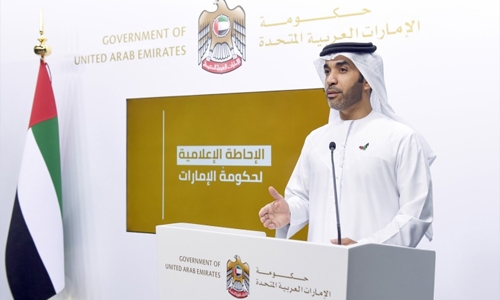UAE Covid-19 vaccination campaign inoculates 52.46 percent of the target population
Agencies | Abu Dhabi
The Daily Tribune – www.newsofbahrain.com
Minister of Health and Prevention Abdulrahman bin Mohamed Al Owais, announced that the UAE has achieved a major milestone in the national COVID-19 vaccination campaign by successfully inoculating 52.46 per cent of the target population.
In statements made during the UAE Government’s media briefing on the pandemic, Al Owais said, “The campaign that was launched nationwide earlier this year, upon the directives of the country’s leadership, has vaccinated nearly 70.21 per cent of elderly people and those with chronic diseases, who are being prioritized.”
According to daily reports of the vaccination campaign, the government has provided nearly seven million vaccine doses to more than 205 medical centers across the country, helping efforts to ensure that the UAE is a leading country in terms of capabilities to vaccinate its population, he added, stressing that this achievement highlights the leadership’s keenness to ensure people’s safety.
He then pointed out that the UAE, since the start of the pandemic, has become an example of in its response to the pandemic, affirming that it was among the first countries to offer multiple options of COVID-19 vaccines from various pharmaceutical corporations to its citizens and residents, WAM reported.
He also highlighted the significant efforts of the national health sector to provide the highest levels of protection to the people, as well as the substantial work taking place to offer the vaccine to the entire population, noting that the availability of the vaccine is one of the key achievements of the country in its battle against the pandemic, and the vaccine is available in different medical centers for free to both citizens and residents.
Despite the provision of the vaccine, everyone must adhere to relevant precautionary and preventive measures to protect the community’s safety, even after being vaccinated, Al Owais further said.
Official Spokesperson of the National Crisis and Emergency Management Authority (NCEMA) Dr Saif Al Dhaheri, addressed the latest procedures and instructions related to preventing the spread of the virus during the Holy Month of Ramadan.
He also congratulated the UAE’s leadership and people for the achievement announced by Al Owais and asserted that the country is a leading example of combatting COVID-19, noting that achieving the target percentage in record time reflects the country’s readiness and ability to manage crises.
This achievement is the outcome of the exerted efforts of all sectors and medical teams operating upon the directives of the country’s leadership, he added, stressing that the community’s health is a priority and its awareness and cooperation, along with the national efforts to reach the recovery phase, contributed greatly to this achievement.
“Under the framework of community responsibility and considering the customs and traditions of the Holy Month of Ramadan, we are announcing, a series of procedures and instructions aimed at maintaining public health and safety during the Holy Month,” he said.
He also pointed out that family or organizational iftar tents or group iftars in public spaces will not be allowed, along with the distribution of iftar meals in front of houses and mosques, explaining that people who wish to distribute iftar meals may coordinate with charity associations, and Zakat and other donations may be donated online.
The distribution of meals and in-kind donations will be limited to official and registered national charity organizations according to approved protocols, he further added, stressing that restaurants will be prohibited from distributing iftar meals inside or in front of their premises, and meals can only be distributed to workers’ accommodation through direct coordination between restaurants and the management of workers’ housing units in every area while respecting social distancing rules.
Regarding Tarawih prayers, Al Dhaheri stated that prayers can take place according to current precautionary controls and previous precautionary measures covering prayers, such as a 30-minute limit, noting that mosques will be closed immediately after prayers. Women’s prayer areas, services and health facilities and outdoor prayer corners in mosques will be closed, he added.
Concerning night prayers during the last ten days of the Holy Month, he further said that the situation will be assessed at that time and current procedures will be updated accordingly, but religious sessions in mosques shall be suspended, noting that people may participate in lectures and religious sessions virtually via smartphones.
“We urge everyone to cooperate and adhere to relevant procedures and instructions.
Intensive inspection campaigns will take place during the Holy Month, and whoever violates declared procedures, whether individuals and institutions, will be subject to legal action,” he stressed.
“The pandemic has created a new reality, but we can enjoy the spiritual atmosphere of the Holy Month while adhering to the precautionary measures. We can still be in contact with our loved ones despite social distancing via social media and digital platforms. Elderly people and those with chronic diseases should avoid gatherings,” he further added while urging the public to get their information from official credible sources and refrain from circulating rumours.
Procedures in the current national protocol may be amended according to the local and global health situation, Al Dhaheri stated while encouraging everyone to adhere to the precautionary measures and to get inoculated.
Related Posts

